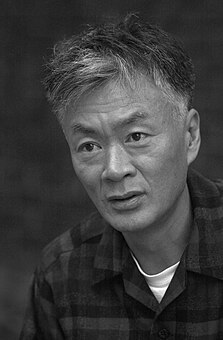Kim Hoon
|
Kim Hoon (2001)
|
|
| Kim Hoon | |
|---|---|
| Hangeul | 김훈 |
| Hanja | 金 薰 |
|
Revised Romanization |
Gim Hun |
|
McCune- Reischauer |
Kim Hun |
Kim Hoon (born May 5, 1948 in Seoul ) is a South Korean writer.
Life
Kim Hoon was born in 1948. He spent his childhood in a barrack village . In Pusan he was very afraid of the sea because he could not get rid of the fear that the whole city would be carried away somewhere by the tide. This fear was formative for his child's psyche. The author confessed that he had always felt fear inside his heart. As a child he was treated countless times with DDT powder because of lice infestation and had the impression that the whole world smelled of DDT. This smell and the fear that the city would be driven away were the defining perceptions of his childhood.
In 1966 he began his studies. He had the great expectation that he would be able to satisfy his hunger for knowledge in the humanities at the university . But the university at the time seemed to him just a stopover for high school graduates who were still too young for professional life. There were few lectures as students demonstrated against corrupt elections. He often stayed at home and did self-study, which he soon broke off.
In a time marked by poverty, but also by passion, he read the romantic works of the 19th century and got to know their basic ideas: People are beautiful and the world is in full harmony. During this time he also discovered the war diary of the famous Korean general Yi Sun-sin , which deeply impressed him. He was fascinated by the hero's demeanor, his rich and dark ideas and how he walked through the hopeless world without any hope. He processed this strong reading impression after thirty years in the novel "Schwertgesang".
He worked as a newspaper journalist for a long time, but was dissatisfied with this job because he no longer wanted to follow the constraints of journalistic writing. He wanted to understand the truth subjectively and therefore said goodbye to his journalistic life. After that, he changed jobs frequently.
As the author said: “You are the wound and misfortune of my life, which is full of conflict. Personal views and preferences were really important to me, not the general and objective. ”At a young age he loved the mountains, in his later years he even loved cycling more than mountaineering. Both were more important and valuable to him than books. For him, "mountains were an addiction and the bicycle a vitamin." During the last ten years in which he worked as a writer, he has received two prestigious prizes, the Tong-In and the Yi-Sang Literature Prize.
Works
stories
- Cremation in the collection for Yi Sang literary award winners 2004, (Seoul: Munhaksasang 2004)
Novels
- Memories of a ceramic cord vessel (Comb-Pattern Vessel) (Seoul: Munhakdongne 1995)
- Sword Singing (Seoul: Thinking Tree Publishing Co 2003)
- The Song of Strings (Seoul: Thinking Tree Publishing Co 2004)
Essay volumes
- The view and the wound (Seoul: Munhakdongne 1994)
- My read books and the world (Seoul: Prunsoop 1996)
- Bicycle trip 1 & 2 (Seoul: Thinking Tree Publishing Co 2004)
- On Which Side You Are On (Seoul: Thinking Tree Publishing Co 2004)
- The boredom of making money (Seoul: Thinking Tree Publishing Co 2004)
Translations
German
- Schwertgesang Edition Delta, Stuttgart 2008, ISBN 978-3-927648-22-7
- Eight lives. Stories Septime, Vienna 2015, ISBN 978-3-902711-45-8
Awards
- 2009 - Artist of the Year, Korean Art Critics Association (한국 예술 평론가 협의회 올해 의 최우수 예술가)
- 2007 - Taesan Literature Prize
- 2005 - Hwang Sun wŏn Literature Prize
- 2004 - Yi Sang Literature Prize
- 2002 - Press award of the Seoul Journalists Club for the best choice of material (서울 언론인 클럽 언론상 기획 취재 상)
- 2001 - Tongin Literature Prize
Individual evidence
- ↑ 네이버 인물 검색: 김훈 , accessed January 20, 2014 (Korean)
- ↑ a b Kim Hun (1948 ~) . In: Authors Database . Literature Translation Institute of Korea , archived from the original on July 4, 2013 ; accessed on April 23, 2019 (English, original website no longer available).
| personal data | |
|---|---|
| SURNAME | Kim, Hoon |
| ALTERNATIVE NAMES | 강석경 (Korean, Hangeul); 金 薰 (Korean, Hanja); Gim, Hun (Revised Romanization); Kim, Hun (McCune-Reischauer) |
| BRIEF DESCRIPTION | South Korean writer |
| DATE OF BIRTH | May 5, 1948 |
| PLACE OF BIRTH | Seoul |
